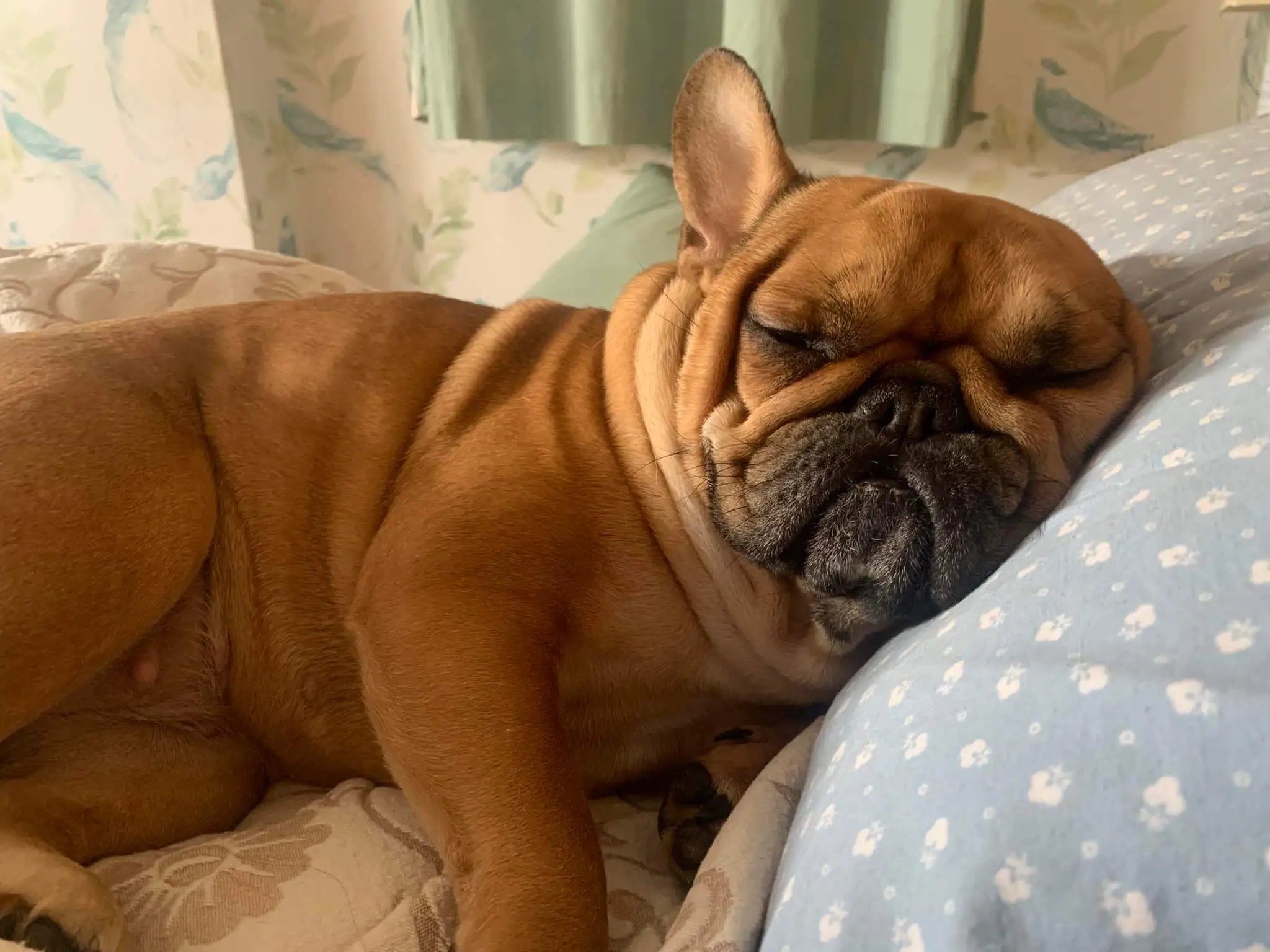How do I make my Frenchie snore less?

French Bulldogs are notorious for their snoring habits, and while it’s a cute characteristic, excessive snoring can become bothersome.
If you’re seeking ways to alleviate or reduce your French Bulldog’s snoring without resorting to simply changing their sleeping position or opting for surgical measures, you’ve come to the right place.
How can you effectively address your French Bulldog’s snoring without resorting to constantly shifting their position or considering surgery?
Throughout this article, we’ll answer these pressing questions and provide insights into practical, long-lasting solutions to help your furry companion breathe more comfortably. If you’re eager to discover ways to mitigate your French Bulldog’s snoring, read on for a range of effective remedies

When Do French Bulldogs Snore More Than Usual and Why?

As previously mentioned, most French Bulldogs are brachycephalic, meaning they have narrow or irregular air passages that can be obstructed. These obstructions hinder the smooth flow of air into their lungs, resulting in audible snoring and grunting while they sleep.
Apart from respiratory issues, here are additional reasons why your furry friend might snore:
-
Allergic Reactions
Allergies are common among dogs, and French Bulldogs are no exception. These allergic reactions can lead to nasal inflammation and swelling of the trachea, or windpipe. Consequently, the already small airways become even narrower, causing louder and more frequent snoring. Common allergens include bug bites, food allergies, dust, pollen, and other typical allergens. If you notice any symptoms or specific sensitivities in your Frenchie, prompt medical attention is recommended.
-
Obesity
French Bulldogs, with their already narrow airways, face an increased risk of airway blockage if they become overweight. While their extra chubbiness might seem adorable, it significantly impacts their breathing. Obesity can lead to the accumulation of excess fat in their throat, restricting air passage and resulting in deeper breathing and increased snoring during sleep.
-
Common Cold
When your Frenchie falls ill with a cold, it naturally breathes more heavily due to airway blockages caused by the illness. Keeping your French Bulldog healthy and ensuring warmth during colder weather can help prevent them from catching colds.
-
Sleeping Posture
Certain sleeping positions might contribute to louder snoring in Frenchies. Some sleeping postures may restrict their airways more than others. Experimenting with different sleeping positions can help determine which ones cause less snoring for your pet

- Elevate their head with a pillow: Adjusting your Frenchie’s sleeping position by using a pillow to slightly raise their head can help alleviate snoring caused by airway obstruction while sleeping. Elevating the head aids in keeping the airways clearer, reducing the chances of vibrations that cause snoring.
- Opt for a bed with raised sides: Consider a bed with built-in raised sides or a pillow to ensure your Frenchie keeps their head elevated. This setup encourages a better sleeping posture that promotes optimal airflow, reducing the likelihood of snoring.
- Try a rounder bed: Encouraging your Frenchie to curl up while sleeping in a circular or round bed can alleviate pressure on the oesophagus and open airways, potentially minimizing snoring. This shape promotes a cozier sleeping position, reducing the likelihood of airway blockages.
- Ensure a cool sleeping environment: Prevent increased snoring due to nasal congestion by having your Frenchie sleep in a cool, well-ventilated room with fresh air. A comfortable temperature ensures their nasal passages remain clear, reducing the tendency to snore.
- Avoid exposure to smoke: Keep your Frenchie away from smoky environments as cigarette smoke can irritate their nose and throat, leading to increased snoring. Reducing exposure to smoke helps maintain healthy respiratory passages, minimizing snoring triggers.
- Use a humidifier: Combat snoring caused by dry air by using a humidifier to moisten the room. This helps in lubricating your Frenchie’s throat, making breathing more comfortable and reducing the chances of snoring due to dry air irritation.
- Investigate allergies: Explore potential allergens like pollen or dust, which could worsen snoring, and consult your vet for allergy checks and suitable remedies. Identifying and managing allergies helps in minimizing snoring triggers.
- Maintain clean bedding: Regularly wash and vacuum your Frenchie’s bedding to minimize allergens and prevent blocked noses due to dust and dirt. Clean bedding reduces the chances of allergic reactions that can contribute to snoring.

-
Manage weight: Prevent snoring by ensuring your Frenchie maintains a healthy weight, as excess weight can obstruct their airways. Managing their diet and exercise helps in controlling weight-related snoring issues.
-
Encourage exercise: Regular exercise not only helps control weight but also reduces fatty build-ups in the throat area, promoting better airflow and potentially reducing snoring. Engaging your Frenchie in daily physical activities aids in keeping their air passages clear.
-
Monitor medication effects: Consult your vet to determine if any current medications could be contributing to snoring by causing airway obstructions. Adjusting medications or dosages can help reduce snoring triggers.
-
Check for airway blockages: Look for any foreign objects or potential tumors in your Frenchie’s throat, which could hinder breathing and cause increased snoring. Identifying and addressing blockages helps in ensuring unobstructed breathing.
-
Address infections: Investigate signs of infections in the mouth or nose as they could be a cause of increased snoring in your Frenchie. Treating infections promptly reduces snoring triggers.
-
Dental check-ups: Regularly inspect your Frenchie’s mouth and teeth for abscesses or decay that might limit airflow and contribute to snoring. Good dental hygiene helps in preventing dental-related snoring issues.
-
Consider underlying health issues: Certain health conditions like allergies, obesity, or brachycephalic syndrome can exacerbate snoring, requiring vet consultation for proper management. Managing underlying health concerns aids in reducing snoring episodes.
-
Avoid human remedies: Refrain from using homeopathic treatments or remedies meant for humans, as they can pose risks and may not be suitable for your Frenchie. Consulting your vet for appropriate remedies ensures their safety.
-
Adjust sleeping positions: Gently change your Frenchie’s sleeping position if they start snoring, as lying on their back can increase snoring due to airway restrictions. Encouraging a side sleeping position promotes better airflow, reducing snoring instances.
-
Separate sleeping spaces: If necessary, keep your Frenchie in a separate room at night to reduce disturbance caused by snoring, providing a quieter sleep environment for both your pet and yourself.
-
Consider surgery as a last resort: In severe cases affecting your Frenchie’s health, consult your vet about surgical options to improve airway passages and reduce snoring severity. Surgical procedures may be recommended as a final solution when other remedies have been ineffective

French Bulldog Snoring Surgery

Frenchies owner thoughts :
My Frenchie makes soft snoring noises when she is happy and relaxed that almost sound like purring to me.
he uses snorts and snuffles to communicate. And he throws a tantrum when I won’t allow him to eat a child that approaches me. (To pet him? Little kids are the best! But if they need my help, they are the spawn of Satan and must be annihilated.)
He doesn’t get the bum wag that I’ve seen docked tail dogs do. But he does a kind of head moving thing instead.
I remember when ours first “barked” lol. It was more moving air forcibly through his mouth – no actual bark. Thought he was weird too. Apparently it’s a thing. Either you get a really talky noisy Frenchie or a weirdly quiet one. He does sometimes bark but it’s usually when he wakes up from sleep startled or it’s something he’s scared/mad at like the Roomba or vacuum. But mostly just quiet huffing

FAQs (Frequently Asked Questions)
Why do French Bulldogs snore so much?
French Bulldogs are brachycephalic, meaning they have short skulls and compressed airways, leading to restricted breathing, which results in frequent snoring.
When should I be concerned about my Frenchie’s snoring?
If your French Bulldog’s snoring is excessively loud, disrupting their sleep, or accompanied by signs of distress, such as gasping for air, it’s advisable to consult a vet.
Can allergies contribute to my Frenchie’s snoring?
Yes, allergies can induce nasal inflammation and tracheal swelling in French Bulldogs, narrowing their airways and causing increased and louder snoring.
Will weight affect my Frenchie’s snoring?
Absolutely. Excess weight in French Bulldogs can lead to airway blockage, creating more snoring. Maintaining a healthy weight can alleviate snoring issues.
What are the potential treatments for a snoring Frenchie?
Various remedies exist, from altering sleeping positions to using humidifiers, keeping bedding clean, addressing allergies, and in severe cases, surgical intervention.
How effective is French Bulldog snoring surgery?
Surgery to address issues like stenotic nares or elongated palates can significantly improve breathing and reduce snoring. However, it’s crucial to consider this option under veterinary guidance due to its cost and implications.
Can I use over-the-counter remedies to stop my Frenchie’s snoring?
It’s not recommended to use over-the-counter remedies without veterinary advice as they may not be safe or effective for your French Bulldog’s specific condition.
What role does sleeping environment play in my Frenchie’s snoring?
Sleeping in a cool room with clean air and proper ventilation can reduce snoring. Avoiding smoke exposure and keeping the room free from allergens might also help alleviate snoring in French Bulldogs.
Are there specific diets that can help reduce snoring in French Bulldogs?
Certain dietary adjustments, such as maintaining a healthy weight and avoiding foods that might trigger allergies, can contribute to reducing snoring in French Bulldogs. Consulting a vet for dietary recommendations is recommended.
Can snoring in French Bulldogs be a sign of an underlying health issue?
Yes, sometimes snoring can be a symptom of a more serious health problem. If the snoring is accompanied by other concerning signs, such as difficulty breathing or excessive daytime fatigue, it’s essential to seek veterinary attention promptly





